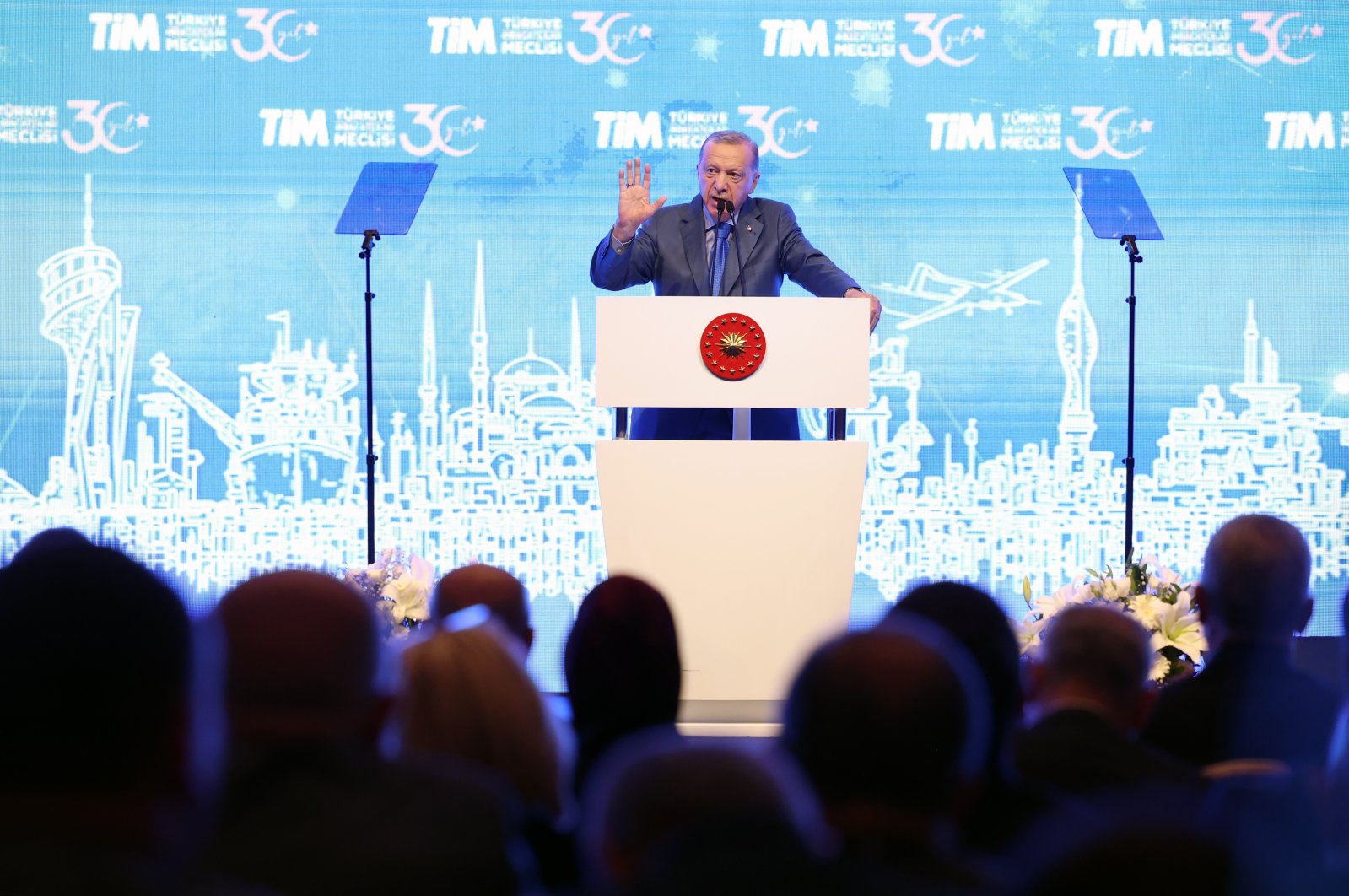
President Recep Tayyip Erdoğan on Saturday reiterated the government’s goal to ease the price pressure on households and said exporters were estimated to reach all-time high shipments by the end of the year.
"We will reduce the inflation, which has been a headache for us and the world for a while, to single digits again,” Erdoğan told an event of the Turkish Exporters Assembly in Istanbul.
Stubborn inflation that has been easing since the beginning of the year has been stressed as a priority for Erdoğan, who reshuffled his economy team after winning reelection on May 28, extending his rule into a third decade.
"With eliminating election uncertainty, our hand is stronger in this regard,” he said.
Annual inflation eased to below 40% in May, a notable regress after touching a 24-year high of 85.5% last October.
Erdoğan named Mehmet Şimşek, a well-respected veteran policymaker, as treasury and finance minister, and Hafize Gaye Erkan, a former Wall Street banker, as central bank governor.
The appointments signaled an economic policy overhaul could be in the pipeline of the newly elected government.
A critic of high borrowing costs, Erdoğan had spent the past two years endorsing a "new economic model” that prioritizes ultra-low interest rates. The model aimed at achieving price stability by slashing borrowing costs, boosting exports and flipping chronic current account deficits to surpluses.
In his comments last week, Erdoğan expressed his backing and said Şimşek would take quick steps in coordination with the central bank, signaling that Türkiye would return to interest rate hikes to combat inflation.
Analysts at leading investment banks now expect Türkiye’s central bank to ramp up its key policy rate at its monetary policy committee meeting on June 22, having slashed it to 8.5% currently from 19% in 2021.
Erdoğan on Saturday also hailed the momentum in exports despite multiple global challenges and devastating earthquakes that struck the country’s southeastern region in early February.
"Despite the negative global economic outlook, we want to increase our exports to $265 billion at the end of this year and $285 billion next year,” he noted.
If achieved, it would mark a third consecutive annual record in shipments. Türkiye made exports worth over $254 billion in 2022, lifting the previous record of nearly $225.4 billion in 2021. Sales were hit by the coronavirus pandemic and dropped to as low as $169.5 billion in 2020.
"Our exports of goods increased by 12.9% to $254.2 billion (in 2022). Our country’s share in global trade rose by 1.02%,” Erdoğan said.
"Our service exports exceeded $90 billion, an increase of 47.3%. Our defense exports increased by approximately 37% to $4.3 billion.”
Erdoğan said Türkiye’s 2028 export target is "$400 billion and above.”
Türkiye’s January-May foreign trade gap jumped nearly 30% from a year ago to $56.1 billion as imports increased 8.9% to $158.6 billion, while exports rose slightly by 0.2% to $102.5 billion.
"We will minimize the energy burden, which is our biggest problem in foreign trade, with Black Sea gas, Gabar oil, Akkuyu Nuclear Power Plant and renewable resources,” he stated.
Türkiye’s energy imports dropped 23.6% year-over-year to $5.3 billion in May, according to the TIM data.
Türkiye is trying to emerge from catastrophic twin quakes on Feb. 6 that killed over 50,000 people and flattened hundreds of thousands of buildings, inflicting severe infrastructural damage.
The disaster disrupted production and supply chains across 11 affected provinces.
Erdoğan said that the tremors seriously damaged not only households but businesses as well. He said that they took action quickly and provided all necessary support to the business world so that the production wheels in the region would continue to turn.
Erdoğan underlined that they would make cities safer, more dynamic, vibrant and prosperous than before.
Despite the headwinds, the Turkish economy remained resilient in the first quarter and expanded by 4% in the January-March period.
"Our economy has grown by 4% in the first quarter of the year and thankfully continues to grow for the last 11 quarters,” Erdoğan said.
"The industrial production index, which decreased every month in February, recovered rapidly and increased by 5.5% in March. The leading data indicate that further growth maintained its strength in the second quarter.”
